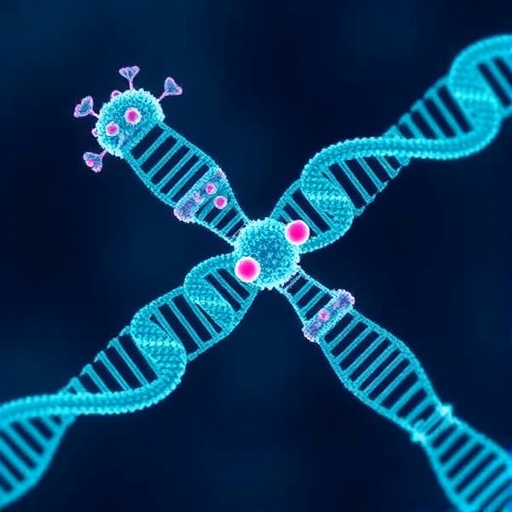In a groundbreaking development at the forefront of microbiology and synthetic biology, a research team led by Professor Graham Hatfull at the University of Pittsburgh has unveiled an innovative approach to engineering bacteriophages with entirely synthetic genomes. This method allows unprecedented precision in adding, removing, and modifying genes within these viruses, which specifically target and kill bacteria. The advancement not only promises to deepen scientific understanding of phage biology but also opens promising new avenues for combating bacterial pathogens resistant to traditional antibiotics.
Bacteriophages, or phages, are viruses that infect bacteria and have been of interest for over a century due to their potential therapeutic uses. However, the complexity and natural variability of phage genomes have historically hindered efforts to manipulate them systematically. Professor Hatfull’s team has overcome these challenges by synthesizing complete phage genomes from scratch, enabling researchers to customize their genetic makeup according to precise experimental requirements. This capability marks a transformative leap in the capacity to dissect phage function and regulation at an unprecedented level of detail.
The synthetic construction of phage genomes permits scientists to interrogate fundamental biological questions that have long remained elusive. For example, among phages that contain upwards of 100 genes, it has been unclear which genes are essential for infectivity, replication, or host interaction and which are redundant or auxiliary. With the ability to design and assemble synthetic phage genomes devoid of certain genes, researchers can now systematically delete or replace individual genetic elements and observe the resultant effects on phage viability and efficacy. This experimental flexibility accelerates discovery, paving the way to understand gene regulation and interaction networks within these viruses.
For their landmark study, Hatfull and his colleagues focused on mycobacteriophages—phages that infect mycobacteria, a genus that includes significant human pathogens such as Mycobacterium tuberculosis and Mycobacterium leprae, responsible for tuberculosis and leprosy respectively. By synthesizing and assembling genomes representative of two naturally occurring high G+C content mycobacteriophages, the team demonstrated that bespoke phage genomes could be “rebooted” or activated to create functioning viral particles in the laboratory. This synthetic rebooting confirms that phages retain their bactericidal properties even when entirely constructed from synthetic DNA.
The practical implications of this breakthrough extend deeply into the field of antimicrobial therapy. Antibiotic resistance poses a grave and escalating threat worldwide, with superbugs rendering many conventional treatments ineffective. Engineered phages, tailored to precisely target specific bacterial strains, offer a potent alternative to broad-spectrum antibiotics. The synthetic genome technique enables the design of phages with enhanced efficacy, specificity, and the ability to evade bacterial defense systems, potentially revitalizing therapeutic strategies against resistant infections.
Moreover, the ability to assemble artificial genomes brings synthetic biology principles into virology, enabling the design of novel phage variants with properties not found in nature. Researchers are no longer restricted to naturally occurring genetic combinations; they can now imagine and realize entirely new genomes that optimize infection mechanics, host range, and safety profiles. The phrase used by Professor Hatfull, “the sky’s the limit,” reflects the vast potential unlocked by this technology to create phages of significant therapeutic and research value.
This ambitious project was carried out in collaboration with two pioneering institutions in biotechnology: Ansa Biotech and New England Biolabs. These collaborations combined cutting-edge DNA synthesis and assembly technologies with decades of expertise in phage biology and mycobacterial research. The integration of synthetic genomics and classical phage biology methodologies ensured that the synthetic genomes were both functional and representative of complex natural phage systems, making this study a model for future interdisciplinary research.
Scaling synthetic phage engineering could also contribute to faster and more effective responses against emerging bacterial threats. By enabling rapid prototyping of phages with tailored genomes, laboratories can adapt to new bacterial variants or outbreaks more swiftly than ever before. Unlike traditional antibiotic development, which can take years, synthetic phage design and validation could be accelerated substantially using this platform, allowing for more agile public health interventions.
Furthermore, the detailed mechanistic insights gained from studying synthetic phage genomes could inform bioengineering efforts to enhance phage stability and delivery in clinical settings. Synthetic manipulation may optimize viral capsid structures, DNA packaging signals, or host recognition receptors, potentially leading to phages that remain active longer in the human body or target hard-to-reach bacterial reservoirs. This could vastly improve the therapeutic index of phage treatment, increasing its viability as a frontline medical tool.
Scientifically, this work also addresses fundamental questions about the modularity and evolution of viral genomes. Through synthetic assembly, researchers can experiment with genome rearrangements, gene insertions from other organisms, or even the creation of chimeric phages. Such experiments could reveal unknown genetic interactions and evolutionary constraints while expanding the molecular toolkit available for viral engineering.
The findings from this study will be published in the prestigious Proceedings of the National Academy of Sciences (PNAS), emphasizing the high impact and relevance of this research to multiple scientific disciplines. Importantly, the project is funded by the NIH and the Howard Hughes Medical Institute, highlighting its critical importance and potential to transform clinical microbiology and synthetic biology.
As the scientific community digests this revolutionary approach, the knock-on effects are expected to ripple across why we study viruses, treat bacterial diseases, and engineer synthetic biological systems. The innovative synthesis and rebooting of phages represent a milestone in both basic and applied research, providing a flexible platform for future innovations that could dramatically reshape bacterial infection management and further advance synthetic genomics.
Contacts for media inquiries and further information about this groundbreaking research are available at the University of Pittsburgh, ensuring that the exciting discoveries will be communicated broadly and promptly as developments progress.
Subject of Research: Cells
Article Title: Genome synthesis, assembly, and rebooting of therapeutically useful high G+C% mycobacteriophages
News Publication Date: 14-Nov-2025
Web References: 10.1073/pnas.2523871122
Keywords: Bacteriophages, Antibiotic resistance, Drug resistance, Artificial genomes, Synthetic biology




